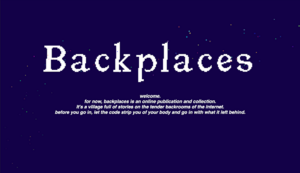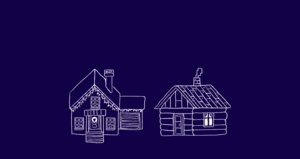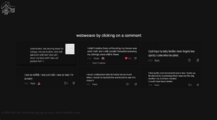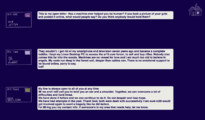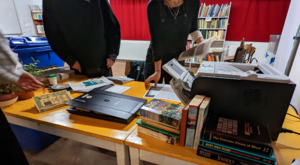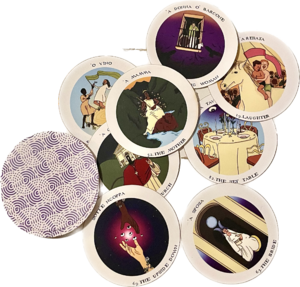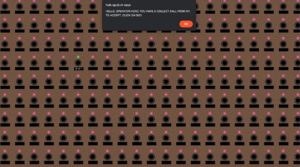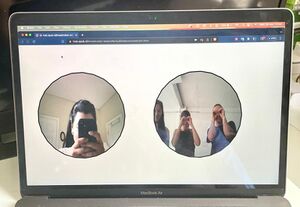User:Ada/Projectproposal: Difference between revisions
No edit summary |
|||
| (52 intermediate revisions by 2 users not shown) | |||
| Line 6: | Line 6: | ||
// [[User:Ada/Graduation|home]] | // [[User:Ada/Graduation|home]] | ||
// [https://hub.xpub.nl/breadcube/~ada/backplaces/ PROTOTYPE] | |||
==<span style="color: black; font-family: Menlo; text-decoration:none; background-color: #F4F2ED; padding-top: 0.1vw; padding-bottom: 0.1vw; padding-left: 0.1vw; padding-right: 0.2vw;"> ⊹ ࣪ ˖ w''hat is this project?'' </span>== | |||
[[File:Screenshot 2023-12-07 at 11.10.50.png|thumb|homepage trial]][[File:Screenshot 2023-11-21 at 14.56.24.png|thumb|the village if you scroll down]]My graduation project is called '''''Backplaces''''' and it's a digital collection exploring the stories of people who have found safety and connection in hidden corners of the internet. It's a web anthology that will be made up of different stories, poems and love letters coming from anonymous people in these invisible places. | |||
My aim with this collection is to explore the dynamics of online anonymity, to reveal how it can nurture vulnerability; to pay tribute to how marginalised people misuse web frameworks to construct personal narratives and to go into the deep connections formed through these narratives. | |||
Practically it's a series of webpages that use html, css and js to engage with the content and data I have gathered so far. The data I am re-interpreting is a combination of messages, survey responses, comments, forms from our public event and an email conversation. I am personally involved in only some of this data, some is from anonymous others only. | |||
==<span style="color: black; font-family: Menlo; text-decoration:none; background-color: #F4F2ED; padding-top: 0.1vw; padding-bottom: 0.1vw; padding-left: 0.1vw; padding-right: 0.2vw;"> ⊹ ࣪ ˖ w'' | ==<span style="color: black; font-family: Menlo; text-decoration:none; background-color: #F4F2ED; padding-top: 0.1vw; padding-bottom: 0.1vw; padding-left: 0.1vw; padding-right: 0.2vw;"> ⊹ ࣪ ˖ w''hy do I want to make this?'' </span>== | ||
My life story may be mine alone, but my emotions have been a shared experience. | |||
Like many others, during the hardest times of my life I found safety in digital spaces. Virtual communities have provided me with real feelings of belonging and were significant to my healing process. They were my first encounters I had with companionship and understanding, and they remain crucial witnesses to certain aspects of my identity to this day. I know I'm not alone in this; I've personally witnessed the remarkable transformations these communities can bring, shaping identities and offering relief to those who seek it. | |||
' | In today's internet landscape, these communities are rare and hard to find, accessible only to internet users that are willing to dig deep. They navigate around the technical frameworks of the platforms that host them, repurposing social media features and avoiding censorship by using code words. | ||
Despite the ever-growing need to hide, they still exist and thrive because humans will always find ways to make these non-human landscapes human-friendly, which is to say filled with care, with softness, and honesty. | |||
This project is a tribute to these communities, and has been crafted with respect and gentleness to acknowledge the digital connections that have meant so much to me and others. | |||
It is also for those who have never experienced this kind of connection, offering an ethnographic study from within to truthfully portray this invisible love. | |||
As a small note on anonymity I have to mention that it's one of my priorities to keep these people and communities as hidden as they wish to be and only share what they wish to be shared. I will do this by changing and hiding names, usernames, places and events to still convey the feeling without disclosing identities. In other words, I will fictionalise the parts of these stories that relate to the physical world. | |||
<gallery widths="300"> | |||
==<span style="color: black; font-family: Menlo; text-decoration:none; background-color: #F4F2ED; padding-top: 0.1vw; padding-bottom: 0.1vw; padding-left: 0.1vw; padding-right: 0.2vw;"> ⊹ ࣪ ˖ h''ow do | File:Screenshot 2023-11-21 at 15.03.59.png|an example of one of the village homepages | ||
File:Screenshot 2023-11-26 at 17.25.39.png|another prototype | |||
</gallery> | |||
==<span style="color: black; font-family: Menlo; text-decoration:none; background-color: #F4F2ED; padding-top: 0.1vw; padding-bottom: 0.1vw; padding-left: 0.1vw; padding-right: 0.2vw;"> ⊹ ࣪ ˖ h''ow do I plan to make it?''</span> == | |||
This project has three slightly overlapping areas of work. | |||
'''I. empirical and theoretical research on online communities''' | |||
This involves gathering data by reaching out and collecting information from the internet and reading literature on (broadly speaking) the concepts of digital expressions of community and intimacy. This informs the work I do for the project but is also to aid the thesis writing. The thesis I am writing is the theoretical backdrop of the project and is in itself a love letter to a hypothetical reader, alongside being an analysis of intimate publics online. | |||
'''II. re-interpretation and experimental writing on the data I have''' | |||
This involves looking at the answers from two survey I ran on reddit, a very long collection of messages and comments from these backrooms and an interview with a digital literature club founder. I will try and find new ways to tell their stories, in what is mostly a writing practice, I want to keep expanding it beyond paper to reimagine these narratives in many ways before the last step. | |||
'''III. coding part''' | |||
This involves taking what I have made in the second part and reimagining it as html, css and js. It often happens at the same time as the actual writing, as I keep it in mind the whole time. | |||
These phases overlap but ultimately follow the below timeline. | |||
==<span style="color: black; font-family: Menlo; text-decoration:none; background-color: #F4F2ED; padding-top: 0.1vw; padding-bottom: 0.1vw; padding-left: 0.1vw; padding-right: 0.2vw;"> ⊹ ࣪ ˖ w''hat is your timetable?'' </span>== | |||
'''December / January''' ''Overall Infrastructure'' | |||
* Review relevant literature on online communities, digital storytelling, and the impact of anonymity | |||
* Test individual webpages for user navigation and readability | |||
* Finalise project architecture, testing different user pathways | |||
* Experiment with storytelling techniques, using both coding and traditional writing | |||
* ''Thesis:'' Keep integrating the results from the storytelling experiments and the theoretical research into the thesis. I aim to have finished the research and have a rough point-by-point of what to write by end of January | |||
'''February / March / April''' Technical Testing Fun Time | |||
* Less theory research, mostly technical research on these projects and how they run and are programmed | |||
* Make even more digital and physical prototypes of the collection components themselves | |||
* Continuously test and gather feedback on the collection from my classmates, teachers and friends | |||
* Develop the platform and stories iteratively based on feedback. | |||
* ''Thesis:'' The first weeks of February I will finalise the first draft and the rest of the time until April will be to tweak and adjust based on feedback from the writing tutor | |||
'''May / June''' ''Design and Production'' | |||
* Review and refine project elements | |||
* Fix mistakes and make new ones | |||
* Prepare for the graduation show by finding the presentation setup | |||
==<span style="color: black; font-family: Menlo; text-decoration:none; background-color: #F4F2ED; padding-top: 0.1vw; padding-bottom: 0.1vw; padding-left: 0.1vw; padding-right: 0.2vw;"> ⊹ ࣪ ˖ w''ho can help you and how?'' </span>== | |||
👐🏽 I have received but will need more of the help and support of people in these backdoor online communities. I have found people to be less willing to talk about it to my body and more willing to talk about it to my computer so I will keep on doing that. These people will be kept fully anonymous and if any detail about them is shared it will be altered to protect their identity. | |||
👐🏽 I've contacted Kendal a previous XPUB student, as her graduation project also explored online places. We are trying to find some sort of time for her to tell me how her project evolved to a phd project. | |||
👐🏽 From the XPUB staff I will continue needing support from the prototyping tutors, Manetta or Joseph who have been supporting me so far. | |||
👐🏽 To prevent issues with me feeling insecure about my skills as a programmer I will keep showing my other xpubs what I'm doing and ask them to be nice and help if needed; especially if I start taking myself too seriously. | |||
==<span style="color: black; font-family: Menlo; text-decoration:none; background-color: #F4F2ED; padding-top: 0.1vw; padding-bottom: 0.1vw; padding-left: 0.1vw; padding-right: 0.2vw;"> ⊹ ࣪ ˖ r''elation to previous practice'' </span>== | |||
[[File:Screenshot 2023-11-27 at 12.30.30.png|thumb|scanning and printing]]In my eyes this project sits somewhere in between methods, practices and topics from my past and from my future. Everything I have done so far is stacked inside the project and the thesis but I am also using the space to explore new ways to practice. | |||
. In terms of past experiences, while I have moved away from my scientific background in communication science and data research, I still carry over a tendency to collect and categorise human interaction. I also still hold close to my heart the interest in marginal groups and media interaction that informed my research back then too. [[File:Final oracle.png|left|frameless]] | |||
. My path within xpub has been pretty silly, which helped me engage with many different ways to practice and stay curious. In the first special issue, [https://issue.xpub.nl/19/ Garden Leeszaal], where we ran a workshop helping people to physically engage with discarded books, I archived what people made by scanning it and then bound it into a book. I didn't see it then, but I know now that my interest was ultimately in how people interacted with the books we provided and in recording their presence. | |||
. For the second special issue one of my contributions was [[✳ Oracolotto|Oracolotto]], a deck of tarot cards based on my cultural heritage and dream interpretation. I also wrote a manual to use the cards themselves. This project allowed me to experiment with using fiction and narrative forms to explore one's feelings. While in the current project I am steering away from the use of cultural archetypes, I am keeping the practice I developed to reimagine cultural symbolism and the use of narrative experimentation. | |||
[[File:Screenshot 2023-11-27 at 12.28.53.png|thumb|switchboard operator|left]][[File:Switchboardon.jpg|thumb|live]] | |||
. For the last special issue, I started to dig inside how technology is informed by its own past. One project I made to do this I completed while attending a summer school in interactive telecommunications. I made a web-based [https://hub.xpub.nl/breadcube/~ada/collectcall/switchboard.html video calling platform] recreating the feeling of a call with a switchboard operator. It can connect any two computers at a time and was specifically made to contact XPUB from New York, where I was. It was part of a process of contextualising modern technology by learning what came before it and questioning why things are they way they are now. It was also a way to stay close to people in a different way. It helped me investigate the possibility of playing with web-based interaction and rethinking intimacy. | |||
''Backplaces'' uses these methods and modes that I am very familiar with, while also helping me expand into areas that I have not explored yet. So far I have found it quite new and honestly fun to try and combine a writing practice with a coding practice for example. I am also still trying different ways for my personal involvement in the project to appear in different formats, changing tones and the amount of self-disclosure. Generally I hope the collection will keep growing and aiding my own interest in learning more about using js and digital literature. | |||
==<span style="color: black; font-family: Menlo; text-decoration:none; background-color: #F4F2ED; padding-top: 0.1vw; padding-bottom: 0.1vw; padding-left: 0.1vw; padding-right: 0.2vw;"> ⊹ ࣪ ˖ r''elation to a larger context'' </span>== | |||
This project draws inspiration from a diverse body of research, reflecting the fundamental role of the internet in the lives of marginalised people (Gonzales, 2015; Mesch, 2011). It uses conceptions and past studies on people who sat outside the norm in their communities and formed digressive digital communities (Adler & Adler, 2008; Smith & Wickes, 2013). In finding the stories and the people I used conceptions of virtual communities (The Government Lab, 2020) that underline the power of virtual communities in nurturing mutual care, belonging, and shared experiences. To identify whether the people I was talking to/about were marginalised I used a conceptualisation of marginalisation (Mowat, 2015) that emphasises inclusivity and acceptance. | |||
For the technical background my work borrows from the way [https://tinyawards.net/ Tiny Awards] celebrates a small, playful and heartfelt web. I was also inspired by the [https://thehtml.review/about html review], an annual literature journal made to exist on the web. I also take more and more from the Net Art Anthology made by Rhizome, a collection of digital art. | |||
In general, ''Backplaces'' relates to any piece of work that saw relational healing as possible, community as necessary and the really delicate matter of belonging and mutual care as the most important thing there is. It meets other projects on that plane of hidden web that one can only find by spending a long time online and by desperately needing to see and be seen, to hear and be heard, to love and be loved back. | |||
Once | |||
. | |||
==<span style="color: black; font-family: Menlo; text-decoration:none; background-color: #6495ED; padding-top: 0.1vw; padding-bottom: 0.1vw; padding-left: 0.1vw; padding-right: 0.2vw;">. ⊹ ࣪ ˖ r''eferences''</span> == | |||
Adler, P.A. and Adler, P. (2008) ‘The Cyber Worlds of self-injurers: Deviant communities, relationships, and selves’, ''Symbolic Interaction'', 31(1), pp. 33–56. doi:10.1525/si.2008.31.1.33. | |||
Gonzales, A.L. (2015) ‘Disadvantaged minorities’ use of the internet to expand their social networks’, ''Communication Research'', 44(4), pp. 467–486. doi:10.1177/0093650214565925. | Gonzales, A.L. (2015) ‘Disadvantaged minorities’ use of the internet to expand their social networks’, ''Communication Research'', 44(4), pp. 467–486. doi:10.1177/0093650214565925. | ||
The Government Lab (2020) ''The power of virtual communities'', ''The GovLab''. Available at: <nowiki>https://virtual-communities.thegovlab.org/</nowiki> (Accessed: 28 September 2023). | The Government Lab (2020) ''The power of virtual communities'', ''The GovLab''. Available at: <nowiki>https://virtual-communities.thegovlab.org/</nowiki> (Accessed: 28 September 2023). | ||
Latest revision as of 20:57, 10 December 2023
// home
// PROTOTYPE
⊹ ࣪ ˖ what is this project?
My graduation project is called Backplaces and it's a digital collection exploring the stories of people who have found safety and connection in hidden corners of the internet. It's a web anthology that will be made up of different stories, poems and love letters coming from anonymous people in these invisible places.My aim with this collection is to explore the dynamics of online anonymity, to reveal how it can nurture vulnerability; to pay tribute to how marginalised people misuse web frameworks to construct personal narratives and to go into the deep connections formed through these narratives.
Practically it's a series of webpages that use html, css and js to engage with the content and data I have gathered so far. The data I am re-interpreting is a combination of messages, survey responses, comments, forms from our public event and an email conversation. I am personally involved in only some of this data, some is from anonymous others only.
⊹ ࣪ ˖ why do I want to make this?
My life story may be mine alone, but my emotions have been a shared experience.
Like many others, during the hardest times of my life I found safety in digital spaces. Virtual communities have provided me with real feelings of belonging and were significant to my healing process. They were my first encounters I had with companionship and understanding, and they remain crucial witnesses to certain aspects of my identity to this day. I know I'm not alone in this; I've personally witnessed the remarkable transformations these communities can bring, shaping identities and offering relief to those who seek it.
In today's internet landscape, these communities are rare and hard to find, accessible only to internet users that are willing to dig deep. They navigate around the technical frameworks of the platforms that host them, repurposing social media features and avoiding censorship by using code words.
Despite the ever-growing need to hide, they still exist and thrive because humans will always find ways to make these non-human landscapes human-friendly, which is to say filled with care, with softness, and honesty.
This project is a tribute to these communities, and has been crafted with respect and gentleness to acknowledge the digital connections that have meant so much to me and others.
It is also for those who have never experienced this kind of connection, offering an ethnographic study from within to truthfully portray this invisible love.
As a small note on anonymity I have to mention that it's one of my priorities to keep these people and communities as hidden as they wish to be and only share what they wish to be shared. I will do this by changing and hiding names, usernames, places and events to still convey the feeling without disclosing identities. In other words, I will fictionalise the parts of these stories that relate to the physical world.
⊹ ࣪ ˖ how do I plan to make it?
This project has three slightly overlapping areas of work.
I. empirical and theoretical research on online communities
This involves gathering data by reaching out and collecting information from the internet and reading literature on (broadly speaking) the concepts of digital expressions of community and intimacy. This informs the work I do for the project but is also to aid the thesis writing. The thesis I am writing is the theoretical backdrop of the project and is in itself a love letter to a hypothetical reader, alongside being an analysis of intimate publics online.
II. re-interpretation and experimental writing on the data I have
This involves looking at the answers from two survey I ran on reddit, a very long collection of messages and comments from these backrooms and an interview with a digital literature club founder. I will try and find new ways to tell their stories, in what is mostly a writing practice, I want to keep expanding it beyond paper to reimagine these narratives in many ways before the last step.
III. coding part
This involves taking what I have made in the second part and reimagining it as html, css and js. It often happens at the same time as the actual writing, as I keep it in mind the whole time.
These phases overlap but ultimately follow the below timeline.
⊹ ࣪ ˖ what is your timetable?
December / January Overall Infrastructure
- Review relevant literature on online communities, digital storytelling, and the impact of anonymity
- Test individual webpages for user navigation and readability
- Finalise project architecture, testing different user pathways
- Experiment with storytelling techniques, using both coding and traditional writing
- Thesis: Keep integrating the results from the storytelling experiments and the theoretical research into the thesis. I aim to have finished the research and have a rough point-by-point of what to write by end of January
February / March / April Technical Testing Fun Time
- Less theory research, mostly technical research on these projects and how they run and are programmed
- Make even more digital and physical prototypes of the collection components themselves
- Continuously test and gather feedback on the collection from my classmates, teachers and friends
- Develop the platform and stories iteratively based on feedback.
- Thesis: The first weeks of February I will finalise the first draft and the rest of the time until April will be to tweak and adjust based on feedback from the writing tutor
May / June Design and Production
- Review and refine project elements
- Fix mistakes and make new ones
- Prepare for the graduation show by finding the presentation setup
⊹ ࣪ ˖ who can help you and how?
👐🏽 I have received but will need more of the help and support of people in these backdoor online communities. I have found people to be less willing to talk about it to my body and more willing to talk about it to my computer so I will keep on doing that. These people will be kept fully anonymous and if any detail about them is shared it will be altered to protect their identity.
👐🏽 I've contacted Kendal a previous XPUB student, as her graduation project also explored online places. We are trying to find some sort of time for her to tell me how her project evolved to a phd project.
👐🏽 From the XPUB staff I will continue needing support from the prototyping tutors, Manetta or Joseph who have been supporting me so far.
👐🏽 To prevent issues with me feeling insecure about my skills as a programmer I will keep showing my other xpubs what I'm doing and ask them to be nice and help if needed; especially if I start taking myself too seriously.
⊹ ࣪ ˖ relation to previous practice
In my eyes this project sits somewhere in between methods, practices and topics from my past and from my future. Everything I have done so far is stacked inside the project and the thesis but I am also using the space to explore new ways to practice. . In terms of past experiences, while I have moved away from my scientific background in communication science and data research, I still carry over a tendency to collect and categorise human interaction. I also still hold close to my heart the interest in marginal groups and media interaction that informed my research back then too.
. My path within xpub has been pretty silly, which helped me engage with many different ways to practice and stay curious. In the first special issue, Garden Leeszaal, where we ran a workshop helping people to physically engage with discarded books, I archived what people made by scanning it and then bound it into a book. I didn't see it then, but I know now that my interest was ultimately in how people interacted with the books we provided and in recording their presence.
. For the second special issue one of my contributions was Oracolotto, a deck of tarot cards based on my cultural heritage and dream interpretation. I also wrote a manual to use the cards themselves. This project allowed me to experiment with using fiction and narrative forms to explore one's feelings. While in the current project I am steering away from the use of cultural archetypes, I am keeping the practice I developed to reimagine cultural symbolism and the use of narrative experimentation.
. For the last special issue, I started to dig inside how technology is informed by its own past. One project I made to do this I completed while attending a summer school in interactive telecommunications. I made a web-based video calling platform recreating the feeling of a call with a switchboard operator. It can connect any two computers at a time and was specifically made to contact XPUB from New York, where I was. It was part of a process of contextualising modern technology by learning what came before it and questioning why things are they way they are now. It was also a way to stay close to people in a different way. It helped me investigate the possibility of playing with web-based interaction and rethinking intimacy.
Backplaces uses these methods and modes that I am very familiar with, while also helping me expand into areas that I have not explored yet. So far I have found it quite new and honestly fun to try and combine a writing practice with a coding practice for example. I am also still trying different ways for my personal involvement in the project to appear in different formats, changing tones and the amount of self-disclosure. Generally I hope the collection will keep growing and aiding my own interest in learning more about using js and digital literature.
⊹ ࣪ ˖ relation to a larger context
This project draws inspiration from a diverse body of research, reflecting the fundamental role of the internet in the lives of marginalised people (Gonzales, 2015; Mesch, 2011). It uses conceptions and past studies on people who sat outside the norm in their communities and formed digressive digital communities (Adler & Adler, 2008; Smith & Wickes, 2013). In finding the stories and the people I used conceptions of virtual communities (The Government Lab, 2020) that underline the power of virtual communities in nurturing mutual care, belonging, and shared experiences. To identify whether the people I was talking to/about were marginalised I used a conceptualisation of marginalisation (Mowat, 2015) that emphasises inclusivity and acceptance.
For the technical background my work borrows from the way Tiny Awards celebrates a small, playful and heartfelt web. I was also inspired by the html review, an annual literature journal made to exist on the web. I also take more and more from the Net Art Anthology made by Rhizome, a collection of digital art.
In general, Backplaces relates to any piece of work that saw relational healing as possible, community as necessary and the really delicate matter of belonging and mutual care as the most important thing there is. It meets other projects on that plane of hidden web that one can only find by spending a long time online and by desperately needing to see and be seen, to hear and be heard, to love and be loved back.
Once
.
. ⊹ ࣪ ˖ references
Adler, P.A. and Adler, P. (2008) ‘The Cyber Worlds of self-injurers: Deviant communities, relationships, and selves’, Symbolic Interaction, 31(1), pp. 33–56. doi:10.1525/si.2008.31.1.33.
Gonzales, A.L. (2015) ‘Disadvantaged minorities’ use of the internet to expand their social networks’, Communication Research, 44(4), pp. 467–486. doi:10.1177/0093650214565925.
The Government Lab (2020) The power of virtual communities, The GovLab. Available at: https://virtual-communities.thegovlab.org/ (Accessed: 28 September 2023).
Mesch, G.S. (2011) ‘Minority status and the use of computer-mediated communication’, Communication Research, 39(3), pp. 317–337. doi:10.1177/0093650211398865.
Mowat, J.G. (2015) ‘Towards a new conceptualisation of Marginalisation’, European Educational Research Journal, 14(5), pp. 454–476. doi:10.1177/1474904115589864.
Smith, N., Wickes, R. and Underwood, M. (2013) ‘Managing a marginalised identity in pro-anorexia and fat acceptance cybercommunities’, Journal of Sociology, 51(4), pp. 950–967. doi:10.1177/1440783313486220.

